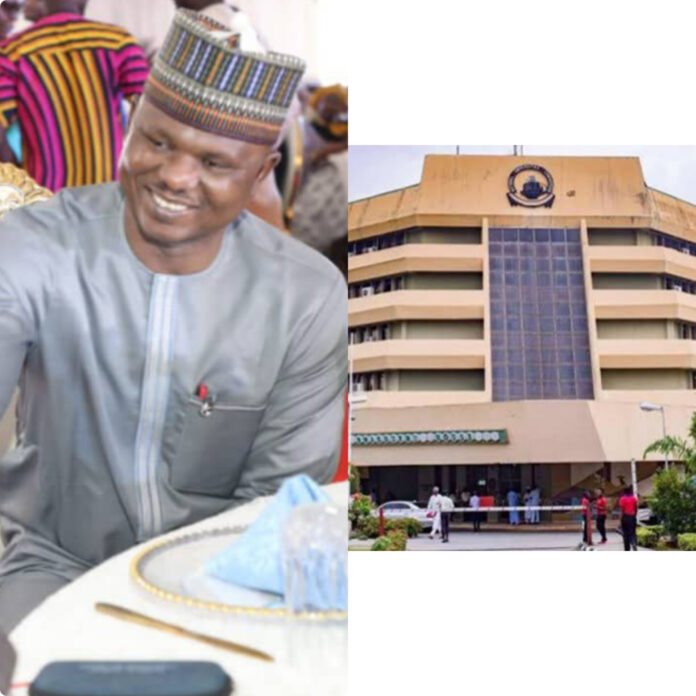By Henry Tyohemba,
The National Commission for Persons with Disabilities (NCPWD) has urged the National Universities Commission (NUC) to work towards incorporating their needs into its curriculum.
The Executive Secretary of the Commission, Mr. James David Lalu, stated this when he led a delegation on a courtesy visit to the Acting Executive Secretary of NUC Mr. Chris Maiyaki, in his office recently.
The aim of the visit, according to Lalu, was to discuss critical matters affecting persons with disabilities in Nigerian Universities.
Lalu, in his speech commended the Acting Executive Secretary for the opportunity to discuss the issues and recounted a personal experience of discrimination he suffered in the hands of a University Management while on admission to study during his undergraduate days.
He recalled his rejection from the course admitted into when the University observed that he was physically challenged and preferred to offer him Special Education to study, which he described as a common experience of persons with disabilities in Nigerian Universities.
To stem the tide, Lalu informed Maiyaki that there was now an existing law in the country barring discrimination against persons with disabilities, while expressing dismay that the just re-engineered University Curriculum did not factor in the needs of persons with disabilities due to lack of consultation with them in the review process.
He therefore requested collaboration with the NUC to address the observed gaps.
Lalu furthwy informed the NUC team that NCPWD is currently working with 13 Universities in Nigeria on the possibilities of incorporating their needs into their curriculum, stating that a Sign Language programme had commenced at Federal University Lafia (FULafia) and hoped that other Universities would soon integrate relevant programmes that would address the needs of people with disabilities.
The NCPWD Executive Secretary appealed to the NUC to champion its demand by introducing some courses that would further address issues of persons with disabilities in the General Studies (GST) programmes of Nigerian Universities.
On employment, he said that there was already an existing Circular from the Office of the Head of Civil Service of the Federation (OHCSF) directing government establishments to give 5% slots to persons with disability during recruitment exercises.
He however, lamented that this had not been honoured by most establishments, stating that this discriminatory practice remained the major challenge of persons with disability, noting that keeping to the tenets of the circular would reduce the suffering among them.
He appealed to Nigerian universities in particular, to empathise with persons with disability both, in admission and recruitment exercises.
Receiving the team, Maiyaki gave a rundown on the establishment of the NUC as a regulatory agency saddled with the responsibility to regulate University education in Nigeria.
He informed the team that Nigeria has 260 Universities as at date, comprising 51 Federal, 62 State and 147 Private Universities and still counting.
He also highlighted some of the major functions of the NUC to include: accreditation of academic programmes, conduct of Resource Verification exercise to new programmes, inspection and monitoring of Universities, issuance of license for Establishment of Private Universities and drafting of curriculum, among others.
Maiayaki further explained that from time to time, the Commission participates in policy formation and formulation for University education in Nigeria, outlining some of the Commission’s recent achievements to include, curriculum re-engineering, the consummation of Guidelines on Transnational Education (TNE), E-Learning as well as Private Open University.
The NUC, he said, has also deepened research culture and strengthened entrepreneurship studies in the Nigerian universities.
While reacting to the issues on persons with disabilities, the Acting Executive Secretary disclosed that the Nigerian University System (NUS) had been responsive and responsible to persons with disabilities as the NUC itself, through its Directorate of Students (DoS), had paid regular visits to the universities to access the status of Student Support Facilities and Services.
“Through this process, the Commission had always recommended that Universities should redesign their programmes and physical facilities to accommodate persons with disabilities.“
He likened the visit of the NCPWD team to the ‘biblical transfiguration’, noting that it was of special significance to the NUC as the management attached great value to people with disabilities and frowned at any form of discrimination against them.
He promised that the Commission would discuss the issues raised on the already re-engineered Curriculum to see how to capture the needs of NCPWD.
Contributing, NUC Visiting Professor Yahaya M. Kuta commended the resilience of the Executive Secretary, NCPWD, to have also enrolled in a PhD programme despite the challenges and discrimination.
He stated that the NUS and the nation at large would continue to respect everybody at different strata and restated NUC’s readiness to promote inclusiveness and to leverage on the gains already made by the NCPWD.


